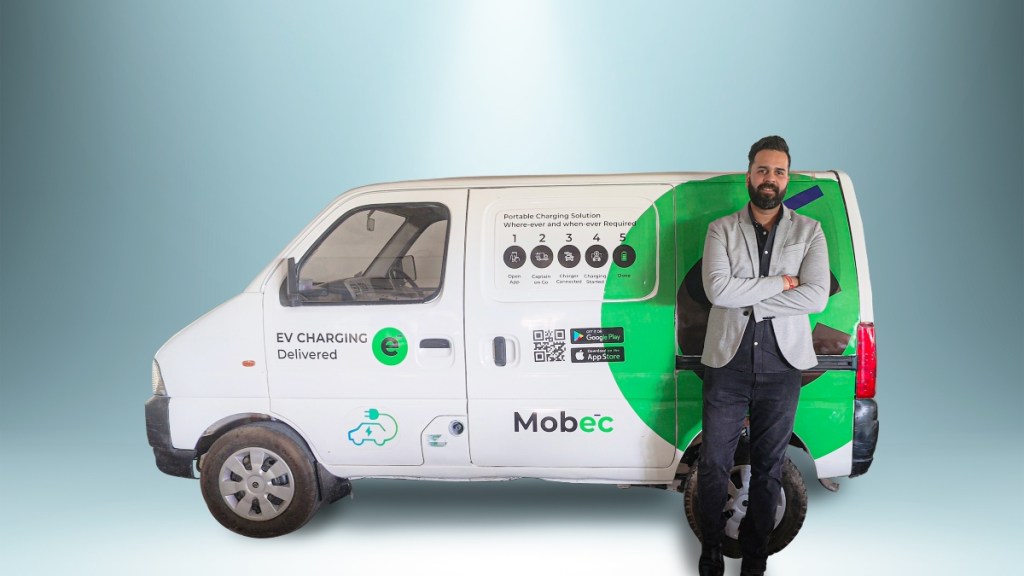By CEO Mobec Innovation – EV Charging Solutions
One of the most important issues of the twenty-first century is climate change, which has far-reaching effects on economies, international organisations, and ecosystems. An international call to action that encourages innovation across industries to produce sustainable remedies has been triggered by the urgency of mitigating its impacts. Tech-savvy startups have become important actors at the vanguard of attempts to address climate change through disruptive technology and sustainable practices, and they are among these innovators.
Developing environmentally friendly solutions to urgent global problems is what sets green tech companies apart, especially in the areas of waste management, energy, transportation, and agriculture. 66% of consumers worldwide don’t mind paying extra for environmentally friendly goods. In addition, 62% of people worldwide think it is more important for businesses to act in a more environmentally friendly and sustainable manner.
These businesses employ innovation and entrepreneurship to grow their line of products and services that minimise harm to the environment, cut greenhouse gas emissions, and improve sustainability.
One area where tech startups have made significant progress is in renewable power. As the transition away from fossil fuels becomes more urgent, startups are beginning to harness the power of solar, wind, hydro and other renewable resources to generate easy energy. Advanced technologies, together with photovoltaics, wind generators and strength garage structures, are being developed to improve efficiency and affordability, making renewable electricity extra available and full of value. In addition to generating clean electricity, green tech startups are also beginning to revolutionize energy consumption through smart grids, energy-efficient appliances and response systems. These innovations optimize energy use, reduce waste and lower the carbon footprint, contributing to a more sustainable and resilient electrical infrastructure. It has also been said that Technologies to reduce carbon emissions reached $755 billion in 2021, a 25% rise as compared to 2020
Transportation represents another frontier for inexperienced technological innovation. With conventional automobiles a major contributor to greenhouse gas emissions, startups are pioneering electric vehicles (EVs), hydrogen fuel cells, and alternative fuels to decarbonize transportation. Electric car manufacturers, along with Tesla and Rivian, have gained huge popularity for their high-end EVs, while startups like Proterra are revolutionizing public transportation with electric buses. In addition, advances in the self-sufficient driving era and transportation-as-a-service modes are poised to revolutionize the way we travel, reducing emissions and congestion in urban regions.
In agriculture, green tech startups are leveraging improvements in precision agriculture, vertical farming, and sustainable farming practices to sell food safety and reduce environmental impact. The technology, along with IoT sensors, drones and AI-powered analytics, enables farmers to optimize the useful use of resources, minimize waste and mitigate agriculture’s ecological footprint. Vertical farming startups like Plenty and AeroFarms are reshaping traditional agriculture by growing plants in a vertical indoor environment, conserving water and reducing the need for insecticides and fertilizers. Similarly, companies like Indigo Ag are cultivating microbial solutions to enhance crop resilience and reduce reliance on synthetic inputs, promoting an extra sustainable and regenerative method of farming.
Waste management is every other area where green tech startups are driving innovation. Traditional waste disposal strategies such as landfills and incineration contribute to pollution and greenhouse gas emissions. Startups are developing technologies for recycling, composting and waste-to-electricity to reduce the environmental impact of waste disposal. Companies like Recycle Track Systems (RTS) use generation to optimize waste series and recycling strategies, divert valuable substances from landfills and sell the circular economy.
The fulfillment of inexperienced technology startups in dealing with weather alternation is not only supported by technological innovation, but also by a shift in buyer alternatives and regulatory frameworks. As awareness of environmental issues grows, customers are increasingly looking for sustainable products and services, prompting a demand for tech-savvy answers. Governments and policymakers are also adopting rules and incentives to help smooth manufacturing adoption, drive investment and market growth in the green tech quarter.
However, technologically inexperienced startups still face several challenges in scaling their innovations and achieving significant impact. Access to investment, market penetration, regulatory hurdles and technological hurdles are a number of constraints that start-ups must navigate on their way to achieving their goals. Collaboration between startups, businesses, governments and academic institutions is important to conquer these challenges and accelerate the transition to a sustainable destiny.
Despite these challenging situations, the rise of inexperienced tech startups gives hope to fight climate change and build a more sustainable world. Through innovation, entrepreneurship, and collaboration, these startups are leading the charge for growing scalable solutions to reduce greenhouse gas emissions, sustain natural assets, and mitigate the impacts of weather change. As they strive to push the boundaries of what’s possible, green tech startups will play a key role in shaping the fate of our planet for generations to come.

Ultimately, green tech startups are pioneering solutions to climate change through innovation, offering promising answers to the urgent situations of our environmentally demanding times. From renewable electricity and transportation to agriculture and waste management, these startups are pioneering technologies and sustainable practices that have the potential to reshape industries, mitigate greenhouse gas emissions, and foster a super-sustainable destiny. While facing full-scale challenges, the collective efforts of green tech startups, supported through sponsorship demand and regulatory projects, hold the key to accelerating the transition to a low-carbon financial system and preserving the health of our planet. fateful generation. As we continue to witness the impact of climate exchange, it’s miles important that we help and defend the paintings of inexperienced tech startups, recognizing their essential role in the main charge for a extra sustainable and resilient world.
One of the most important issues of the twenty-first century is climate change, which has far-reaching effects on economies, international organisations, and ecosystems. An international call to action that encourages innovation across industries to produce sustainable remedies has been triggered by the urgency of mitigating its impacts. Tech-savvy startups have become important actors at the vanguard of attempts to address climate change through disruptive technology and sustainable practices, and they are among these innovators.
Developing environmentally friendly solutions to urgent global problems is what sets green tech companies apart, especially in the areas of waste management, energy, transportation, and agriculture. 66% of consumers worldwide don’t mind paying extra for environmentally friendly goods. In addition, 62% of people worldwide think it is more important for businesses to act in a more environmentally friendly and sustainable manner.
These businesses employ innovation and entrepreneurship to grow their line of products and services that minimise harm to the environment, cut greenhouse gas emissions, and improve sustainability.
One area where tech startups have made significant progress is in renewable power. As the transition away from fossil fuels becomes more urgent, startups are beginning to harness the power of solar, wind, hydro and other renewable resources to generate easy energy. Advanced technologies, together with photovoltaics, wind generators and strength garage structures, are being developed to improve efficiency and affordability, making renewable electricity extra available and full of value. In addition to generating clean electricity, green tech startups are also beginning to revolutionize energy consumption through smart grids, energy-efficient appliances and response systems. These innovations optimize energy use, reduce waste and lower the carbon footprint, contributing to a more sustainable and resilient electrical infrastructure. It has also been said that Technologies to reduce carbon emissions reached $755 billion in 2021, a 25% rise as compared to 2020
Transportation represents another frontier for inexperienced technological innovation. With conventional automobiles a major contributor to greenhouse gas emissions, startups are pioneering electric vehicles (EVs), hydrogen fuel cells, and alternative fuels to decarbonize transportation. Electric car manufacturers, along with Tesla and Rivian, have gained huge popularity for their high-end EVs, while startups like Proterra are revolutionizing public transportation with electric buses. In addition, advances in the self-sufficient driving era and transportation-as-a-service modes are poised to revolutionize the way we travel, reducing emissions and congestion in urban regions.
In agriculture, green tech startups are leveraging improvements in precision agriculture, vertical farming, and sustainable farming practices to sell food safety and reduce environmental impact. The technology, along with IoT sensors, drones and AI-powered analytics, enables farmers to optimize the useful use of resources, minimize waste and mitigate agriculture’s ecological footprint. Vertical farming startups like Plenty and AeroFarms are reshaping traditional agriculture by growing plants in a vertical indoor environment, conserving water and reducing the need for insecticides and fertilizers. Similarly, companies like Indigo Ag are cultivating microbial solutions to enhance crop resilience and reduce reliance on synthetic inputs, promoting an extra sustainable and regenerative method of farming.
Waste management is every other area where green tech startups are driving innovation. Traditional waste disposal strategies such as landfills and incineration contribute to pollution and greenhouse gas emissions. Startups are developing technologies for recycling, composting and waste-to-electricity to reduce the environmental impact of waste disposal. Companies like Recycle Track Systems (RTS) use generation to optimize waste series and recycling strategies, divert valuable substances from landfills and sell the circular economy.
The fulfillment of inexperienced technology startups in dealing with weather alternation is not only supported by technological innovation, but also by a shift in buyer alternatives and regulatory frameworks. As awareness of environmental issues grows, customers are increasingly looking for sustainable products and services, prompting a demand for tech-savvy answers. Governments and policymakers are also adopting rules and incentives to help smooth manufacturing adoption, drive investment and market growth in the green tech quarter.
However, technologically inexperienced startups still face several challenges in scaling their innovations and achieving significant impact. Access to investment, market penetration, regulatory hurdles and technological hurdles are a number of constraints that start-ups must navigate on their way to achieving their goals. Collaboration between startups, businesses, governments and academic institutions is important to conquer these challenges and accelerate the transition to a sustainable destiny.
Despite these challenging situations, the rise of inexperienced tech startups gives hope to fight climate change and build a more sustainable world. Through innovation, entrepreneurship, and collaboration, these startups are leading the charge for growing scalable solutions to reduce greenhouse gas emissions, sustain natural assets, and mitigate the impacts of weather change. As they strive to push the boundaries of what’s possible, green tech startups will play a key role in shaping the fate of our planet for generations to come.
Ultimately, green tech startups are pioneering solutions to climate change through innovation, offering promising answers to the urgent situations of our environmentally demanding times. From renewable electricity and transportation to agriculture and waste management, these startups are pioneering technologies and sustainable practices that have the potential to reshape industries, mitigate greenhouse gas emissions, and foster a super-sustainable destiny. While facing full-scale challenges, the collective efforts of green tech startups, supported through sponsorship demand and regulatory projects, hold the key to accelerating the transition to a low-carbon financial system and preserving the health of our planet. fateful generation. As we continue to witness the impact of climate exchange, it’s miles important that we help and defend the paintings of inexperienced tech startups, recognizing their essential role in the main charge for a extra sustainable and resilient world.
Disclaimer: Views expressed are personal and do not reflect the official position or policy of Financial Express Online. Reproducing this content without permission is prohibited.



















